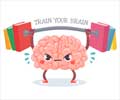
Orphans who are later adopted by foster families have normal levels of white matter, which relays messages in the brain, but less of the grey matter which contains nerve cells and governs our muscles, senses, memory, emotions and speech.
Researchers said the deficit most likely down to the absence of stimulation required for normal brain development, with many children in care having been exposed to deprivation and physical and psychological neglect.
But the improvement among those who were moved to foster families showed that it is possible to "catch up" in terms of white matter - which plays a key role in our learning ability and allows the brain to function properly, they said.
The findings could explain why children who spend time in care on average have lower IQ and language skills, and are at higher risk of developmental issues such as attention deficit/hyperactivity disorder and mental health problems, the scientists added.
The team, led by Harvard University and Boston Children's Hospital researchers, studied MRI scans from a group of eight to 11 year old Romanian orphans, some of whom had been transferred to quality foster care homes.
Advertisement
"One of the most likely explanations for the wide range of developmental problems observed among children exposed to institutional rearing is that the deprived environment of an institution does not provide adequate experience onto which to scaffold normal brain development."
Advertisement
His colleague Dr Margaret Sheridan added: "Increasingly we are finding evidence that exposure to childhood adversity has a negative effect on brain development. The implications are wide ranging, not just for institutionalised children but also for children exposed to abuse, abandonment, violence during war, extreme poverty and other adversities."
The study is published in the Proceedings of the National Academy of Sciences journal.
Source-ANI















